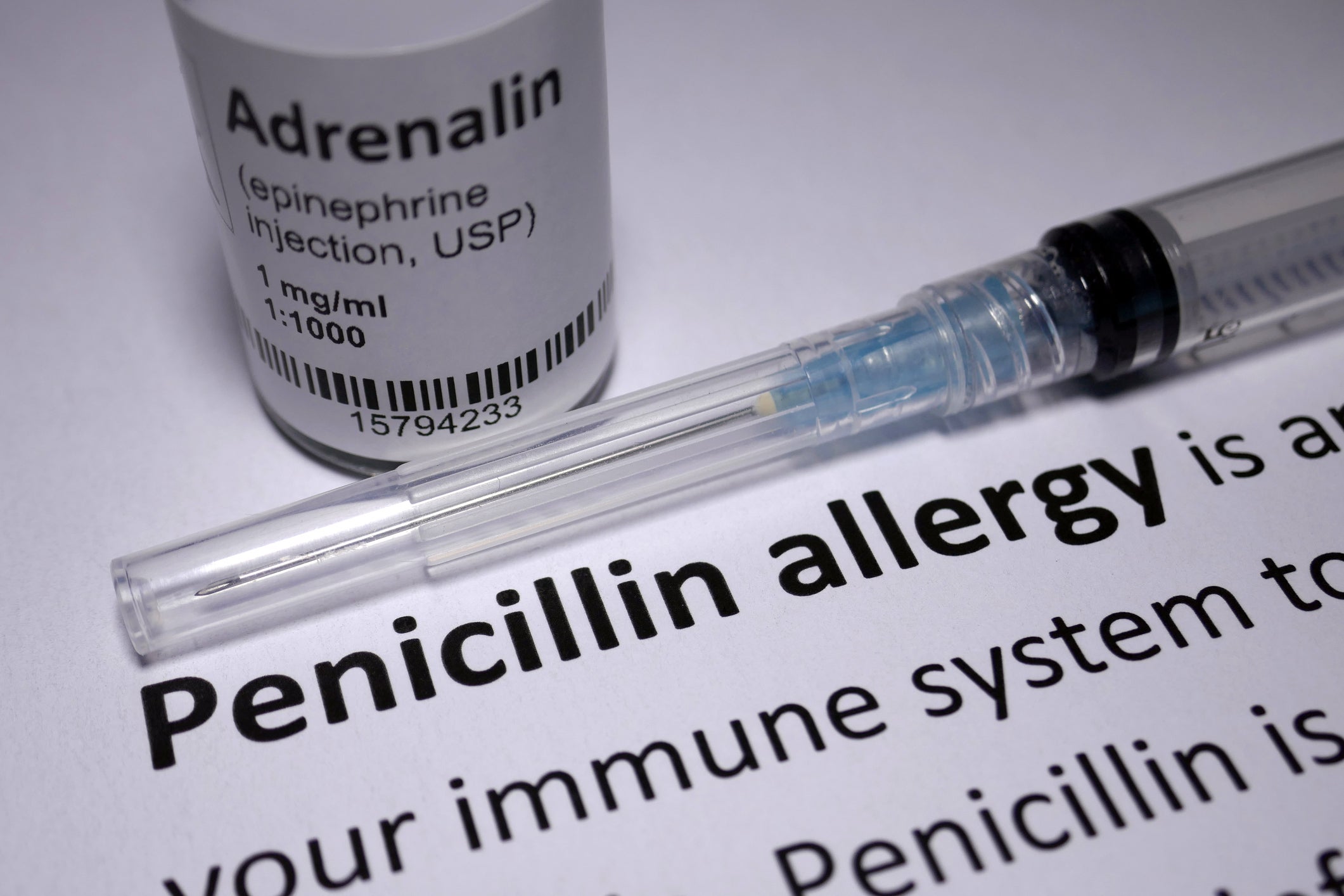A significant number of patients recorded as having a penicillin allergy may not actually be allergic to the antibiotic, a groundbreaking new trial suggests.
Researchers indicate that those with this marker on their medical records could benefit from tests to confirm or rule out a true allergy.
Removing incorrect labels, they add, could significantly improve patient care, help tackle antibiotic resistance, and save money for the NHS.
The first-of-its-kind study, published in the Lancet Primary Care and spearheaded by the University of Leeds, recruited 823 patients from 51 GP practices across England.
Participants had no prior history of severe reactions to penicillin.
The trial involved testing patients for a penicillin allergy, initially with either an oral dose of the antibiotic or a small injection under the skin
If no immediate adverse reaction occurred, individuals were then given a three-day course of penicillin to take at home, under the careful monitoring of the research team.

Of the 365 people tested for an allergy, some 234 had an oral test, with 13 testing positive, while 131 had a skin test, three of which were positive.
Elsewhere, 128 patients had an oral test after a skin test, with 14 testing positive for an allergy.
Overall, the study found 30 patients tested positive for a penicillin allergy, while 335 – or 92 per cent – tested negative.
After three months, 276 patients had the allergy removed from their medical records.
And after 12 months, allergies were removed from the records of 321 patients, or 88 per cent of the group that was tested.
Dr Jonathan Sandoe, lead author and associate clinical professor in microbiology at the University of Leeds School of Medicine and Leeds Teaching Hospitals NHS Trust, said: “Antibiotics have been life-saving drugs since the late 1930s, but we are now in an era where microbes are evolving to resist the effects of current antibiotics.
“The global challenge of antibiotic resistance is causing people to die of common infections, so it is vital to find ways to improve how antibiotics are used.
“Assessing people with penicillin allergy labels is one way we can achieve this.”
Patients who had the allergy check also had fewer antibiotics overall, the study suggests.
As part of the study, researchers analysed the cost-effectiveness of allergy testing based on the NHS model.
They said that although results may vary in different countries, the study observed “tendency towards reducing consultations, days in hospital, and emergency admissions” which “suggest that the penicillin allergy assessment pathway is cost-effective in the short run and increasingly likely to be so over longer follow-up periods”.
Researchers now suggest that “access to penicillin allergy assessment for patients should be widened”.

Dr Sandoe added: “This research shows that removing incorrect penicillin allergy labels has the potential to improve patient experiences, reduce health costs and tackle bacterial resistance.
“Now, we need to work together with policymakers and patients to help the NHS to address this issue.”
Professor Sue Pavitt from the University of Leeds, who jointly led the study, said her mother Rosie Woollard had a penicillin allergy added to her medical records in the 1950s.
She had been prescribed the antibiotic for mastitis – a common infection usually linked with breastfeeding – and developed a rash.
Prof Pavitt said: “My mum was vigilant and avoided taking penicillin from that day, but her allergy was never checked.
“It may have been a simple reaction to the other substances used in manufacturing the tablet or her rash was just a consequence of the infection.
“When my mum got older and had more underlying health problems, we noticed that when she had an infection, she often needed two or three courses of different antibiotics before the infection would clear.
“Each round of antibiotics took a toll on her wellbeing, appetite and ability to bounce back until the infection was under control.”
Ms Woollard developed repeated urinary tract infections later in life and died at the age of 91. Her cause of death was recorded as an antimicrobial infection.
Prof Pavitt said: “Antibiotic allergy and resistant bugs are complex concepts to understand – she was our barometer to see if we were explaining things clearly.
“She was also instrumental in making the Alabama trial open to older people with multiple long-term conditions, a group that is often excluded from research but important to reach.
“This research is in part her legacy and shows the value of preserving antibiotics, so that we can keep fighting infections with these important medicines.”
Christopher Butler, a professor of primary care in the Nuffield department of primary care health sciences at the University of Oxford, said: “It’s this kind of research question that has a huge impact on improving care for individuals, improving cost-effectiveness of what we do as clinicians, and helps us preserve the precious shared resource of of antibiotics to all of us and to future generations.”


